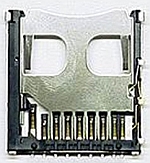Reading the CM1 2B1 production specs, I was struck by a curious diversion from the One Laptop Per Child's Open Source Manifesto.

A naked SD slot
Secure Digital (SD) is a proprietary flash memory card format, including Content Protection for Recordable Media (CPRM) encryption hardware, based on the MultiMediaCard (MMC) format.
I can see why OLPC might be interested in SD slots, many cameras use the SD format and SD slots can support SDIO (SD Input/Output), which means the SD slot can be adapted to take add-ons like Bluetooth adapters, GPS devices, RFID readers, digital cameras, etc.
Still, Secure Digital isn't inline with the overall Open Source mindset of the One Laptop Per Child program. Its definitely not Open Source and it's not even Open Standards. In fact, it's highly closed and proprietary. To quote Pal Lever on Linux Devices:
"SD and SDIO card IP is protected via patents, trade secrets, and copyrights. If you follow the license terms, keep the IP confidential, and make your payments to the right parties, then you can legally ship an SD/SDIO stack."But what does that mean in essence? Back to Paul:
"You really can't offer an SD or SDIO stack in open-source form and meet the licensing requirements currently in effect for these devices."Wow, so OLPC is pretty much violating its own Open Source manifesto that states:
Must support and promote open and patent unencumbered data interchange and file formats.Why is that? Why would the very principled One Laptop Per Child go against the Open Source community in such a obvious way?

Wouldn't a fourth USB port been better? Or as a commentor on the OLPC Wiki says:
"Should I dare to mention USB connected multicard readers? Offering only a single solution [SD] on the OLPC leans towards proprietary-ness."That it sure does.


> "You really can't offer an SD or SDIO stack in open-source form and meet the licensing requirements currently in effect for these devices."
Linux already has a SD driver in place since version 2.6.17; the driver will presumably be used by OLPC. It has a web page at:
http://mmc.drzeus.cx/wiki/Linux/Drivers/sdhci
Chris, as far as I can tell, the original SD driver was a community hack.
The SD Card Association released a simplified spec only after it was reverse-engineered:
http://www.technovelty.org/linux/waste-of-effort.html
The point is, the existence of drivers (and the simplified spec) does not make the format any less proprietary than the SD association themselves claim it to be.
My guess is that OLPC's product will have to meet the SD Association's licensing agreement, an outline of which is referenced in the Linux Devices link in the post above. Full details of the license can be found on the SD Card association's website:
http://www.sdcard.org/
Walter Bender in his October 16 news letter sheds some light on the subject. In item 4, he said
"... [The] SD card controller is being modified to strictly match the public SDHCI specification. To the best of our knowledge, this should be the first truly Open Source SD implementation, with no need to obtain an SDI license or sign NDAs to create SD drivers or applications."
So it looks OLPC is being a bit more open than you think.
Thanks for the update Tim, I missed that in Walter's announcement.
This is purchasing power persuasion I can fully support, OLPC bringing Open Source solutions to previously proprietary products. May they do the same for all technologies they touch.
I guess in this situation where the border line between the proprietary and Open source can’t be define very clearly, the approach like http://www.jinvanisystech.com Jinvani has taken can lead to a feasible path to begin with.
They are providing free Linux stack binary and it can be a big help in many ways. I Hope support for more host can be added soon with the active participation of industry.